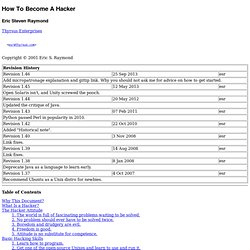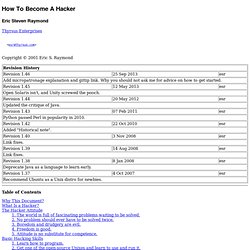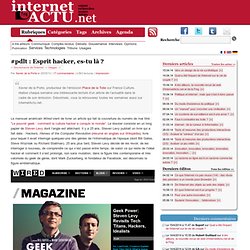

5 Reasons to Allow Students to Use Cell Phones in Class. This morning, a discussion between members of my PLN on Plurk got me thinking about rules in school that ban cell phone usage.

In today's post I'm going to explore five reasons why banning cell phones in schools is bad policy and detrimental for our students. If we are preparing our students for life after school, we should allow them to use the tools they will be using when they get there. How many jobs can you think of right now where a smart phone is not beneficial? Mechanics order parts on their phone, engineers view blueprints, doctors calculate dosages, and grocers check inventory. The list is endless. For those who have read the Harry Potter books or seen the movies, a member of my PLN showed drew a great parallel between events in those stories and this debate with the following quote: "Children, put away your wands. Now it's your turn. A Magazine Is an iPad That Does Not Work.m4v. Hackers by National Geographic. How To Become A Hacker. Copyright © 2001 Eric S.

Raymond As editor of the Jargon File and author of a few other well-known documents of similar nature, I often get email requests from enthusiastic network newbies asking (in effect) "how can I learn to be a wizardly hacker? ". Back in 1996 I noticed that there didn't seem to be any other FAQs or web documents that addressed this vital question, so I started this one. A lot of hackers now consider it definitive, and I suppose that means it is. Still, I don't claim to be the exclusive authority on this topic; if you don't like what you read here, write your own. If you are reading a snapshot of this document offline, the current version lives at. What is a Hacker. Copyright © 2001 Eric S.

Raymond As editor of the Jargon File and author of a few other well-known documents of similar nature, I often get email requests from enthusiastic network newbies asking (in effect) "how can I learn to be a wizardly hacker? ". Back in 1996 I noticed that there didn't seem to be any other FAQs or web documents that addressed this vital question, so I started this one. A lot of hackers now consider it definitive, and I suppose that means it is. Still, I don't claim to be the exclusive authority on this topic; if you don't like what you read here, write your own. If you are reading a snapshot of this document offline, the current version lives at Note: there is a list of Frequently Asked Questions at the end of this document.
Numerous translations of this document are available: ArabicBelorussianChinese (Simplified), Czech, Danish, Dutch, Estonian, German, GreekItalianHebrew, Norwegian, PersianPortuguese (Brazilian), RomanianSpanish, Turkish, and Swedish. 1. 2. 3. #pdlt : Esprit hacker, es-tu là. Xavier de la Porte, producteur de l’émission Place de la Toile sur France Culture, réalise chaque semaine une intéressante lecture d’un article de l’actualité dans le cadre de son émission.

Désormais, vous la retrouverez toutes les semaines aussi sur InternetActu.net. Le mensuel américain Wired vient de livrer un article qui fait la couverture du numéro de mai titré : “Le pouvoir geek : comment la culture hacker a conquis le monde”. Le dossier consiste en un long papier de Steven Levy dont l’angle est alléchant. L’idéal hacker Je fais une parenthèse terminologique.
Levy rappelle à quel point ces préceptes ont inspiré des générations de programmeurs, d’intellectuels et d’entrepreneurs et à quel point aussi toute personne qui utilise un ordinateur en profite, “l’internet lui-même existe grâce aux idéaux hackers”, résume-t-il. Comment le code façonne l’humanité Parmi les Titans, il y a évidemment Bill Gates.
Hackers: Heroes of the Computer Revolution - Wikipedia, the free. The book saw an edition with a new afterword (entitled "Afterword: Ten Years After") by the author in 1994.[1] In 2010, a 25th anniversary edition with updated material was published by O'Reilly.[2] Levy's description of hacker ethics and principles[edit] First and foremost to Levy's principles is the concept of the hacker ethic and the popularization of them to popular culture. In Levy's own words, the principles dictate; Access to computers—and anything which might teach you something about the way the world works—should be unlimited and total. Always yield to the Hands-on Imperative! The hacker ethic deals with the idea that individuals are performing a duty for the common good, an analogy to a modern day 'Robin Hood'.
Preface[edit] Levy decided to write about the subject of hackers because he thought they were fascinating people. For this book, Levy talked to many different hackers, who were active from the 1950s until the 1980s. Who's Who[edit] Part One: True Hackers[edit] 1. 2. 3. 6. 7. Are you computer literate?